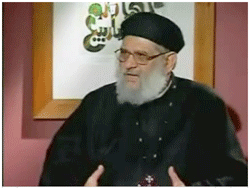
Local religious leaders believe they’ve successfully convinced a local AM radio station to force a regular guest on one of its programs to tone down his intense, often strange commentaries critical of the Islamic faith.
Egyptian Coptic priest Zakaria Botros, known around the world for his controversial theological rants about Islam, had been featured regularly for weeks on a Chaldean Christian programming broadcast by WNZK (690 AM), enraging many with frequent assertions that Islam’s Prophet Mohammed, was, among other things, a homosexual.
Muslim leaders feared the weekly programs could cause tension between local Christian and Muslim communities, and sought out talks between interfaith leaders and the station owner about pressuring producers and the host of the show to keep the more radical commentaries off the air, said Ghalib Begg, Chair of the Council Of Islamic Organizations Of Michigan.
“It seems the hate speech has stopped,” Begg said.
After hearing furious complaints about the program for weeks, a group of Sunni and Shia Imams gathered in an emergency meeting in Dearborn on July 28 to discuss the issue, deciding to pursue a resolution through interfaith representatives, Begg said.
“As much as this show was not a good thing, it brought the Imams together,” he said.
The group continues to look to create positive outcomes from an ugly situation.
Begg said they are planning a meeting with station executives on Aug. 20 to work out a way to buy airtime for interfaith programming.
“Our objective now is to do something positive,” he said.
Owner of the Southfield-based radio station, Sima Birach, confirmed that he is “working on this case,” but did not comment further as of press time Thursday.
Email messages sent to two area Coptic priests were not returned.
Another local Arab Christian leader, Fr. George Shalhoub of St. Mary Antiochian Orthodox Church in Livonia, said that Botros’ outbursts may come from a bitterness felt by many Egyptian Christians, who he said have struggled to practice their faith in that country for years.
“Historically, Christians in Egypt have been persecuted,” he said.
Religious life for Copts in Egypt, said Shalhoub, whose congregation is made up primarily of Palestinian, Syrian, Jordanian and Lebanese Americans, is much harder than in other Arab countries with large Christian populations, where, he said, there is mutual respect and tolerance between Muslim and Christian groups.
“Father Zakaria is fueled by desperation, but no one should be condemned by other people’s faith,” he said. “Just leave him alone and he’ll go away… There are fanatics among Christians. There are fanatics among Muslims. There are fanatics among Jews. If we pay attention to fanatics, we become fanatic… Don’t forget we have freedom of speech here. No one can silence another by force.”
Shalhoub said that radical religious rhetoric is only fueled by the outrage it causes and that problems arise between Christians and Muslims locally only when members of the two communities try to prove each other wrong about their faith.
“We have wonderful relationships with our Muslim brothers and sisters here,” he said. “They don’t need us to legitimize their faith, and we don’t need them to legitimize our faith… They know who we are. If somebody’s on the radio, turn it off,” he said.
Begg said that ignoring Botros was considered as an option in the first meeting among local Imams in July.
“They know this is not the first time someone has done this,” he said. “It’s not so much about some guy making noise. Their concern was the average guy on the street. It’s not good for relationships… We need to stop these kind of divisions that are being created. It’s not healthy for the community.”
Begg, a co-founder of the dialogue organization Interfaith Partners, said local religious leaders have worked hard for years to build relationships with each other.
“This guy is doing the opposite,” he said about Botros.
A second option the Imams first considered, he said, was to “bombard all the advertisers” supporting the program, putting real pressure on the producers with the threat of financial consequences.
In the end the group decided to assemble a committee of interfaith representatives to express their concerns to the station in a way that would create relationships rather than burn bridges.
Begg said a diverse group of people that included Chaldeans participated in communicating their indignation Botros’ most divisive commentaries, which at times included strangely detailed theories about the Prophet Mohammed’s sexuality.
Imam Baqir Berry, of the Islamic Institute of Knowledge, one of the leaders who coordinated the discussions among religious leaders and with the station, said that because of a real fear of tension between communities during times of heightened fear and animosity toward Islam in the US, Botros could not be ignored.
“This is really dangerous,” he said. “When he’s defaming all those people in this community, they want to speak out. We cannot just close our eyes to it.”
Berry said he was impressed with the receptiveness of station owner Birach.
“He promised to make them stop defaming the Prophet,” he said.
Berry and Begg said the Christian programs on the station, while still featuring theological discussions that might include criticisms of Islam, seem to have cut out the offensive, inflammatory elements, taking on a more respectful tone.
They said they would continue to monitor the shows, one of which airs every Wednesday from 3-5 p.m.
“And we would do the same thing if someone comes out demonizing Jesus or (denying) the Holocaust,” said Begg.






Leave a Reply